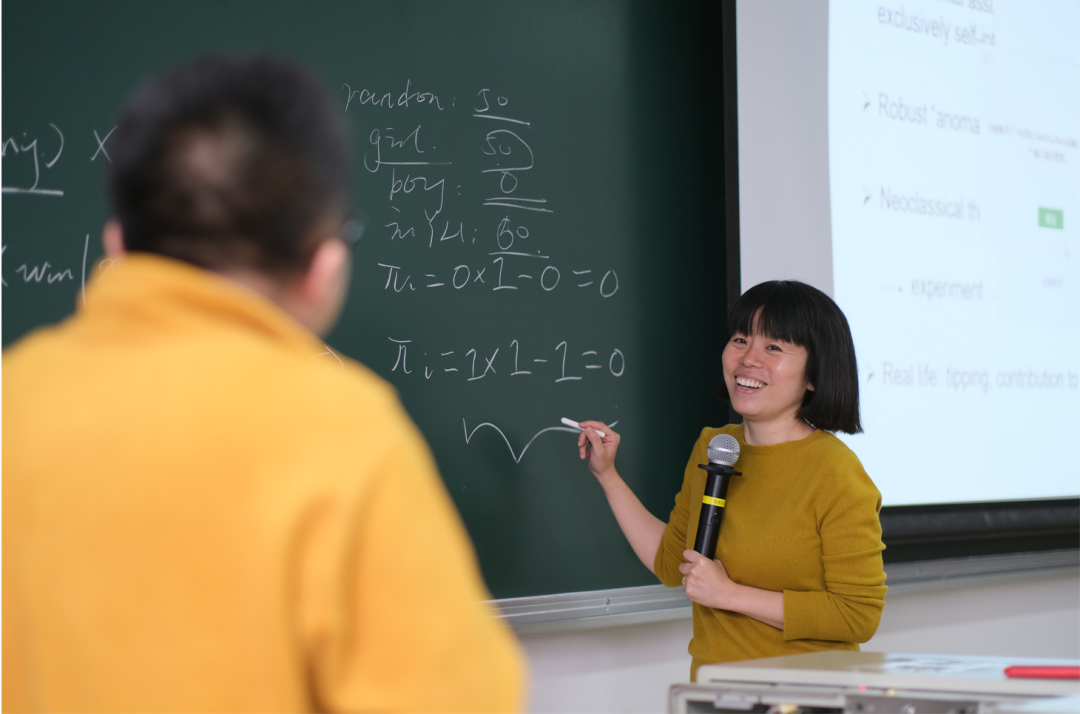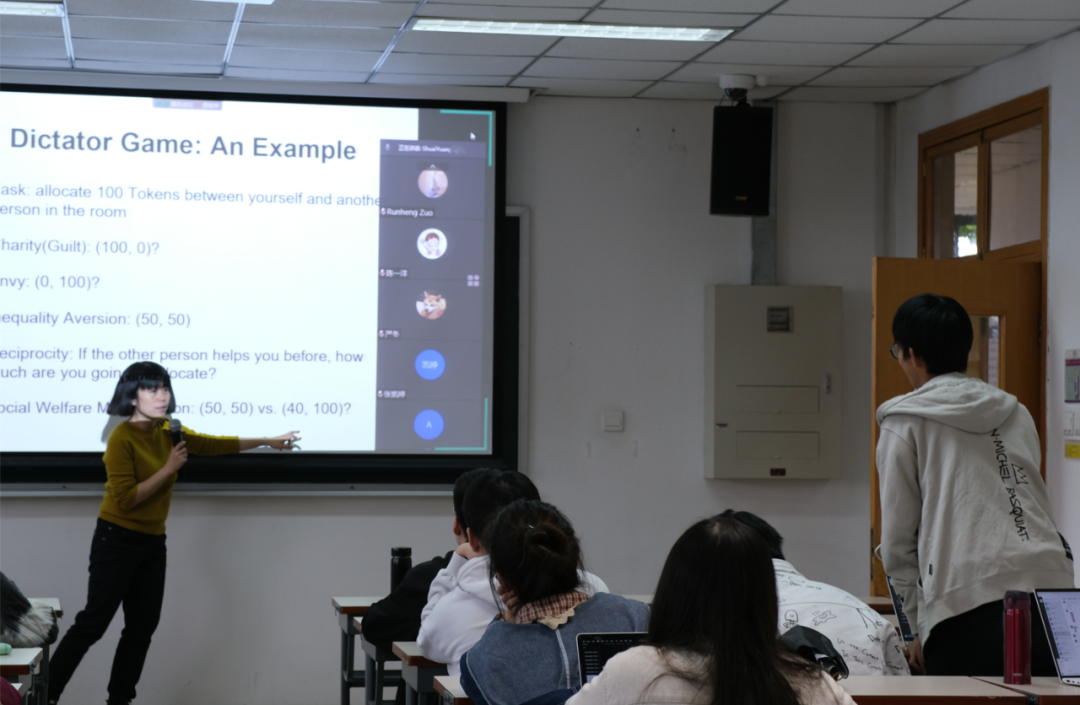In the 2022 spring semester, LIU Tracy Xiao, an associate professor at Tsinghua School of Economics and Management (SEM), taught courses on game theory, behavioral economics, and experimental economics for Tsinghua University's Global Hybrid Classroom (GHC) project for the second consecutive year. Based on her previous GHC experience, Professor LIU made various innovations in her teaching approaches.

Professor LIU Tracy Xiao gives a lecture on game theory.
Including More Real-Life Cases to Make Knowledge More Accessible
In the 2021 spring semester, when Professor LIU taught the courses on the same three subjects for the GHC project, she learned many valuable lessons from the experience and had some new ideas about teaching methods. After deciding to take part in this year's project, she began reflecting on how to help students from different cultural and academic backgrounds understand the lessons she planned to teach .
As well as in-person and virtual interactions, class experiments, guided analyses and discussions, and her other usual approaches, Professor LIU thought she needed to come up with new teaching methods. She tried to include more contemporary, real-life cases to make her lessons more accessible to her students. She believed that if the cases were closely related to the students' lives, the students were more likely to put themselves in those situations and to become motivated to think more deeply about the course content and to engage in discussions.
This semester, Professor LIU talked about more real-life cases concerning the digital economy. Based on economic phenomena that the students were familiar with, she explored topics such as the sharing economy, price wars between platforms, and big data-enabled price discrimination in her lectures. For example, during a lecture about big data-enabled price discrimination, the students who often made online purchases had some relevant real-life experiences and were motivated to participate in the analysis and discussion session. They felt that the related economic concepts were more accessible. During a lecture about price wars, Professor LIU did not relate the cases in the textbooks. Instead, she explained the related concepts through the price models of the ride-hailing and food delivery platforms that the students often used in their daily lives. "The cases in the textbooks happened a long time ago. They may be archetypal, but they are far away from the students' lives, so the students may find it difficult to imagine themselves being in those situations and think about the problems," Professor LIU said.
In another lecture, a student used the game theory to explain how to order food online at bargain prices, drawing other interested students to take part in a discussion. Professor LIU felt surprised and happy to see this. "This year we put a lot of effort into preparing case studies. The students were more willing to participate. A lot of international students were more motivated to take part in class presentations. I think analyses of these cases can help the students to think more deeply," she said.

Professor LIU interacts with a student in class.
Bringing in Chinese Historical Stories to Promote Cultural Exchanges
Professor LIU said that the courses on behavioral economics and experimental economics included many references to research on design of many platforms for China's digital economy. Through the GHC project, she explained the development of China's digital economy to the international students. She said she thought the project provided an ideal opportunity to tell stories about China and spread Chinese voices.
This semester, Professor LIU used many cases studies from China to illuminate her points, including historical stories and explanations about the development of the nation's digital economy. During one lecture, she used the "Besiege Wei to Rescue Zhao" story to help her students to understand game strategies. Many international students found her approach unusual and interesting.
"It was a little bit challenging to explain Chinese history to foreign students in English, but I just wanted to use these interesting historical stories to explain economic models," Professor LIU said. She believed that she could handle such challenges. From the feedback, she saw that her approach was very effective in helping the students to understand traditional Chinese culture. "The teaching process produced positive byproducts: spreading Chinese culture and promoting cultural exchanges," she said.
Encouraging Students to Think More Deeply
"I wanted to help the students foster curiosity about the world and inclusiveness, and encourage them to think critically," Professor LIU said. She hopes that her courses can help her students to think more deeply.
She said the course on game theory is a good example. The case studies that she selected were daily life events that concerned every student. She hopes that the course helps her students to use the thinking of game theory to understand everyday phenomena and their own lives.
Professor LIU firmly believes that economics has warmth, and she wanted to demonstrate this in all her lectures. Economics is based on Homo economicus and studies human behavior. Some people take other people's feelings into consideration rather than focusing solely on their own interests. As a result, they act in a mutually beneficial way. Sometimes, they make irrational decisions and act accordingly. Economics research is not all about telling people what they should do." In social sciences, we study humans and try to understand them." Professor LIU said that she hopes that her lectures could make her students see the necessity of understanding seemingly irrational human behavior and help them foster inclusiveness.
One of Professor LIU's students plans to pursue a career in policy studies after graduation. The student, who found the lectures on decision making behavior very helpful, consulted Professor LIU on several ideas and hopes to find ways to serve society.
Editor: REN Zhongxi
 Latest News
Latest News